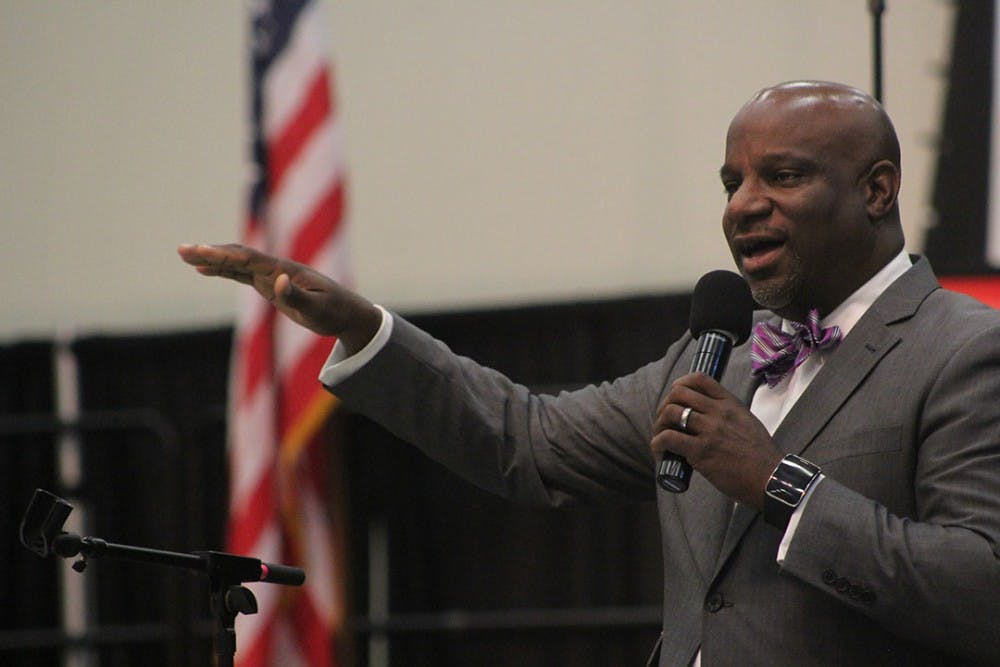Almost 50 years after the assassination of the Rev. Martin Luther King Jr., the 29th annual March for Humanity was held at Shippensburg University on Jan. 28 in SU’s Ceddia Union Building.
Each year, the March for Humanity is held in celebration of King’s life, and in recognition of the steps he took to end segregation in the U.S. The theme of this year’s march was “Hate won’t win,” created as a tribute to the Charleston Nine killed at Mother Emanuel African Methodist Episcopal Church in Charleston, South Carolina, this past June.
The march provided an opportunity for students, faculty and staff to stand together in the face of the injustices that have occurred nationwide in recent months.
Events of the ceremony included introductions from Christopher Jones, the vice president of SU’s African American Organization (AAO); a slideshow of civil rights pictures of the past and present, a performance by SU’s Harmonic Voices of Truth and the distribution of the Dr. Martin Luther King Jr. Humanitarian Award to exceptional people in the Shippensburg community.
Featured speakers included SU President George “Jody” Harpster, Diane Jefferson, director of the Multicultural Student Affairs (MSA) and the Rev. Mark Tyler of Philadelphia’s Mother Bethel African Methodist Episcopal Church.
Tyler, comparing the civil rights movements of 50 years ago to the present, said that there is still much to be done and urged young people to use their voices to take a stand against hate crimes and racial profiling.
This year’s march follows a series of crimes that have occurred over several years’ time toward minority groups. These incidents, while occurring mainly against African-American males, have led to the deaths of individuals such as Trayvon Martin, Michael Brown and Freddie Gray.
The fact that all three of these men were African-American, as well as two of the men being in police custody at the time of their deaths, led to protests throughout the U.S. and created a high amount of tension between minority groups and law enforcement.
“[The violence] does not change by accident, it needs someone to intervene,” Tyler said. “Things are calling for you to raise your voice.”
These “things,” according to Tyler, include equality in education, living conditions and voting rights. In Philadelphia last year, the city declared a new minimum wage of $12 an hour. However, businesses located in the city are refusing to follow the new law due to contracts held within the company, according to Tyler.
The companies’ refusals to agree to Philadelphia’s minimum wage law has forced low-income employees to take unpaid days off work, with little to no extra resources available for basic necessities for themselves or their families.
“Whenever you have majority black citizens, the government takes over,” Tyler said.
Tyler and Jefferson said that one of the easiest ways for students to take a stance against injustice is by using their social media accounts.
“Face to face, over social media, it doesn’t matter,” Jefferson said. “We have to use what we’ve got.”
After the ceremony, students, faculty and guests walked outside to begin their march around the campus. SU student Lakahya Trueblood said that the march was very moving, and was glad to see that such a diverse group of people had attended the event.
The March for Humanity began at 3:30 p.m. and was open to SU students, faculty and the Shippensburg community, and it is held every year at SU. Free T-shirts were handed out to everyone who decided to join the march around campus. The March for Humanity is sponsored by the university’s AAO, in a partnership with the MSA.




The Slate welcomes thoughtful discussion on all of our stories, but please keep comments civil and on-topic. Read our full guidelines here.